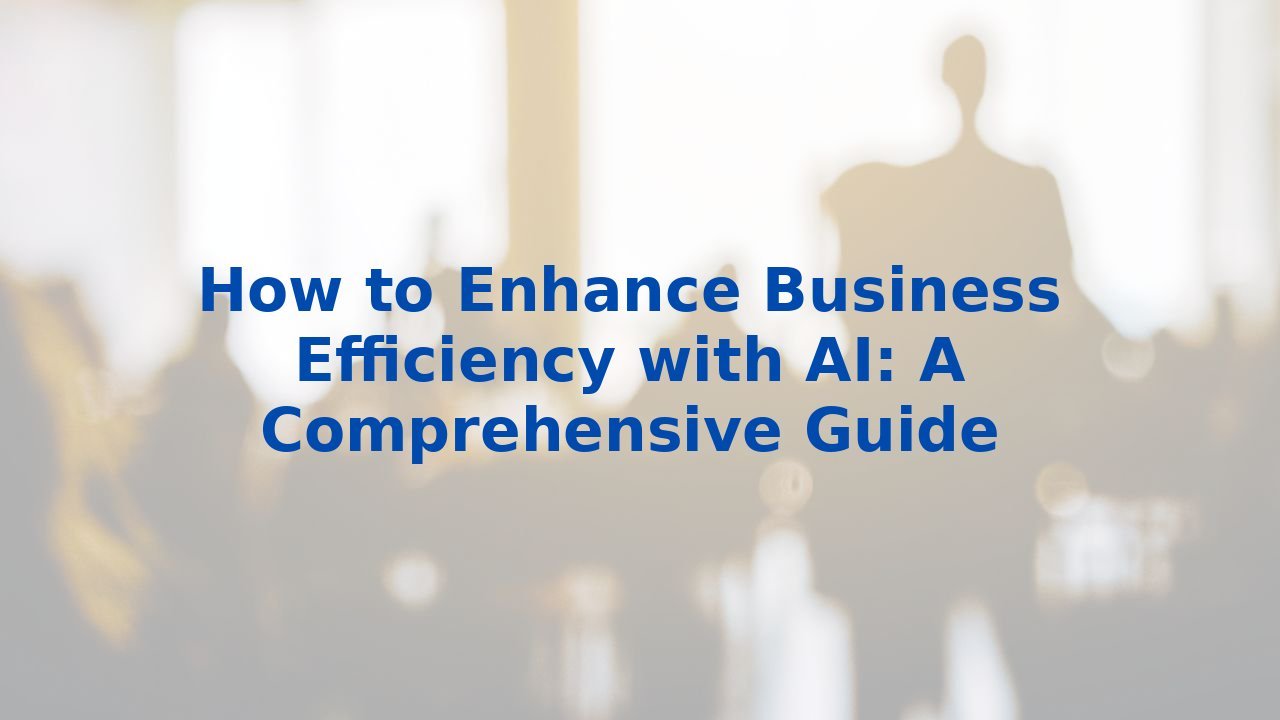How to Enhance Business Efficiency with AI: A Comprehensive Guide
Enhancing Business Efficiency with AI: A Comprehensive Guide
In a world that moves at lightning speed, businesses face an ongoing challenge: how to improve efficiency and remain a step ahead of the competition. Enter Artificial Intelligence (AI)—an incredibly potent ally that holds the potential to transform how organizations operate. By integrating AI into various business processes, companies can elevate productivity, reduce operational costs, and enhance customer experiences. Let’s explore how AI can significantly uplift your organization’s efficiency.
1. Process Optimization
Business processes often entail repetitive, rule-based tasks that drain valuable time and resources. AI steps in as a game-changer here. By automating mundane activities like data entry, invoice processing, and appointment scheduling, it liberates employees to focus on higher-value work. This not only increases operational precision but also elevates consistency across the board. Imagine the difference it can make when your team spends less time on routine tasks and more on strategic initiatives.
2. Advanced Data Analytics
Today's businesses operate on data. With AI's advanced machine learning algorithms, organizations can analyze vast volumes of data at unprecedented speeds. This capability allows companies to extract valuable insights, identify trends, and make predictions that inform decision-making. By embracing a data-driven approach, businesses can optimize inventory levels, anticipate market movements, and devise strategies rooted in comprehensive analyses.
3. Customer Experience Personalization
In an age where personalization is paramount, AI can vastly improve customer interactions. By analyzing customer preferences, purchase histories, and browsing behaviors, AI equips businesses to offer tailored product recommendations and marketing messages. This targeted approach not only fosters deeper customer loyalty but also enriches customer satisfaction by ensuring that interactions resonate personally.
4. Predictive Analytics
AI doesn't stop at analyzing the past; it keenly forecasts future trends and behaviors. Leveraging historical data, AI can project demand patterns, assist in more accurate inventory management, and optimize production schedules. This forward-thinking methodology minimizes inefficiencies within operations, reduces costs, and ensures organizational resources are allocated intelligently—directly impacting the bottom line.
5. Error Reduction and Quality Control
Human error is an inevitable risk in any operational framework. However, with AI in play, the likelihood of mistakes diminishes significantly. By processing large data sets rapidly and accurately, AI identifies patterns and trends, enhancing outcomes in areas like financial accounting or data management. Furthermore, AI-driven quality control scrutinizes products for defects in real-time, ensuring only the highest standards of quality are maintained.
6. Risk Management
In an unpredictable business landscape, effective risk management is imperative. AI empowers organizations to discern risks and opportunities through its analytical prowess. By sifting through expansive datasets, AI can forecast market volatility and surface emerging trends. This foresight enables businesses to strategically mitigate risks while capitalizing on opportunities, nurturing a more resilient and agile enterprise.
7. Supply Chain Management
Modern supply chains are inherently complex and demand adaptability. AI provides the crucial insights needed to navigate this complexity. By analyzing both historical and real-time data, AI predicts demand fluctuations, optimizes inventory levels, and suggests efficient shipping routes. The result? A supply chain that is not only more efficient but remarkably responsive to market changes.
Benefits of Training Employees for AI
Integrating AI into your processes isn’t merely about the technology itself; it’s equally about the people who will use it. Providing employees with AI training is pivotal, and here’s why:
- Enhanced Collaboration: When employees are skilled in AI, they can seamlessly collaborate with these systems, maximizing the utility of the insights generated.
- Improved Decision-Making: With training, employees can interpret AI-driven data effectively, leading to more informed and strategic decisions.
- Adaptability: A workforce equipped with AI knowledge is better prepared to navigate the rapid changes in technology, pushing the organization ahead of the curve.
- Human Touch: Despite all the capabilities AI offers, human judgment and empathy remain irreplaceable, especially in customer interactions. Trained employees provide the personal touch that enhances satisfaction and loyalty.
Conclusion
The era of AI is upon us, and its transformative capabilities can drastically improve business efficiency and innovation. From automating routine tasks to leveraging advanced data insights, adopting AI can lead to remarkable productivity gains and cost savings. Additionally, investing in training your employees to navigate and collaborate with AI technologies ensures that your organization fully embraces the benefits these tools offer.
In today's evolving business landscape, embracing AI isn't just an option—it's essential for staying competitive and pioneering new paths for growth.



